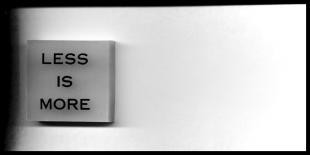Simplify Your Life: 7 Steps To Becoming A Work Minimalist


I’ve been a minimalist most of my life. With the exception of a small children’s book collection, most of the items in my possession are things absolutely necessary to my day-to-day existence. I attribute my minimalist lifestyle to having moved cross-country with my family as a child and becoming obsessed with the idea of changing my living situation whenever I felt like it. It simply is too hard to move often if you own lots of stuff.
Minimalism as a movement has taken off in recent years, challenging individuals to break out of the consumerist cycle and strive to own fewer material things. Some interpretations of minimalism take this to the extreme, such as the 100 Thing Challenge or “How To Fit Everything Into a 42 Litre Backpack.” This move towards material minimalism has also begun to take root in business culture as well, with more and more folks following what is often referred to as “work minimalism” or “essentialism.”
The "Culture of Busy"
Since the 1980’s, employees have increasingly felt the pressure to put in more hours at work. In periods of economic uncertainty, employees often tend to work more in order to distinguish themselves from fellow employees, as well as prove their dedication to the company. The current startup boom has only exacerbated this trend, as late hours and working on weekends are seen as required sacrifices to get your company off the ground. Additionally, smart phones and social media have made us more accessible than ever, confusing the definition of “being on the clock” and blurring the line between work and personal time.
One of the most common ways I see this cultural trend manifested is the humblebrag regarding how little sleep one is getting. I myself am guilty of this, sharing with coworkers how tired I am because I was up late working on a work-related project in hopes they will be impressed with my dedication.
What is Work Minimalism?
Minimalism is the idea we should have less things. Work minimalism is the belief that putting in more hours does not necessarily mean one is more productive. Instead, work minimalists or “Essentialists”, as termed by author Greg McKeown, are focused on “the disciplined pursuit of less, but better.” Each day should have a strict set of goals and a set amount of time in which to complete those goals. By restricting the time available to finish a task, Essentialists believe work is performed more efficiently, while avoiding issues of burnout and stagnation.
While researching for her book “Overwhelmed: Work, Love and Play When No One Has the Time”, author Brigid Schulte came across one company putting this theory into practice with its employees. Menlo Innovations, a software-design firm based in Michigan, is very strict regarding its 40-hour work week and views staying late as a sign of employee inefficiency. In fact, the company states that employees who cannot figure out how to do their job in 40 hours will be fired.
Beginning Your Work Minimalism Journey
As with material minimalism, there is a spectrum for approaching work minimalism. Timothy Ferriss advocates for an extremely reduced schedule in his book “The 4-Hour Work Week” for example. However far you choose to go in your pursuit of less, but better, here are a few tips to get you started:
- Say no to a good opportunity. Author Greg McKeown explains being asked to do something isn’t a good reason to get involved. Being involved in more won’t necessarily bring more to our lives. Instead of taking on another client or project, say no—no matter how good the opportunity. It is only when you give yourself time with the projects you have, you’ll begin to determine what you are passionate about.
- Don’t get stuck in traditions. Similar to doing something simply because you’re asked, doing something because you’ve always done is not productive either. Getting caught up in traditions can prevent you from moving forward. Shake things up and try something new!
- Rest. Stick to a bedtime and ensure you are getting enough sleep to feel energized when you wake up.
- Eliminate before adding. Make the rule for yourself of one in, one out. If you want to coach your daughter’s soccer team, leave the nonprofit board you’re currently serving. Again, by focusing on less projects at a time, it will become more clear what you’d like to invest your time in.
- Focus on a limited number of tasks each day and devote real time to them. Set 2-3 goals for yourself each morning and focus on only those goals. You’ll find projects go faster when you aren’t thinking about working through a to-do list of 30+ items.
- Just like a goldfish will grow to the size of the bowl it occupies, tasks will take up the time you allot them. If you give yourself three hours for a task, the task will take three hours. Pushing yourself to complete something in less time will help you increase efficiency.
- Lastly, lead by example. If you are the manager or owner of company, it is important you follow a 40 hour work week. If you work late hours, your employees will follow your example. If you answer emails on weekends, your employees will feel the need to as well.
There are many great resources available to get more tips how to work more efficiently, not just more. Here are a few of my favorite reads:
- Overwhelmed: Work, Love and Play When No One Has the Time, by Brigid Schulte
- Essentialism: The Disciplined Pursuit of Less, by Greg McKeown
- TED Talks on productivity
Image Credit: Floriana via Flickr



